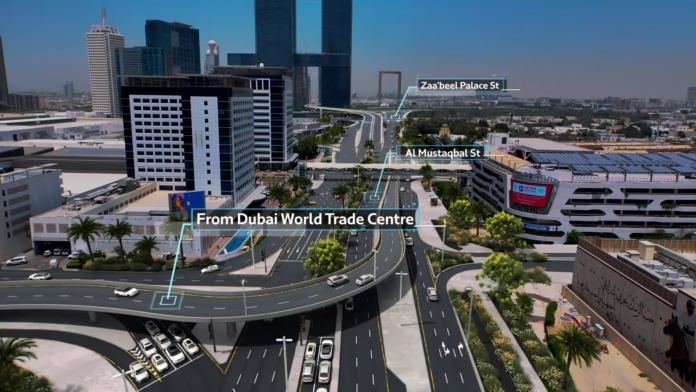Dubai has launched a major infrastructure upgrade through the Al Mustaqbal Street development project. On Sunday, the Roads and Transport Authority (RTA) awarded a Dh633 million ($172 million) contract for the initiative. This project focuses on reducing traffic congestion and improving connectivity in central Dubai.
Specifically, the Al Mustaqbal Street development stretches from Zabeel Palace Street to Financial Centre Street. It includes the construction of three tunnels. These tunnels will handle up to 9,000 cars per hour, easing pressure on one of Dubai’s busiest corridors.
Additionally, authorities will build a 450-meter, two-lane bridge. This bridge will carry traffic from Dubai World Trade Centre to the Zabeel Palace Street intersection.
Moreover, Al Mustaqbal Street will be widened from three lanes to four lanes in both directions. This expansion covers 3,500 meters and aims to increase road capacity significantly. As a result, the project will raise traffic capacity from 6,600 vehicles per hour to 8,800 vehicles per hour. It also intends to reduce average travel times from 13 minutes to just six minutes.
Furthermore, the project team will upgrade pedestrian and cycling infrastructure alongside the vehicle infrastructure. The project includes improved walkways, a new dedicated cycling track, and additional lighting. In addition, public spaces will also be developed to beautify the area and enhance community use.
Although the RTA confirmed the project’s scope and value, it did not reveal the expected completion date.
Importantly, the Al Mustaqbal Street development is part of a larger master plan for the Dubai World Trade Centre Roundabout. This broader initiative improves connectivity to Sheikh Zayed Road, Dubai’s main transport artery.
Officials expect the plan, first announced in October, to benefit 500,000 residents and visitors. Moreover, officials confirmed that construction began in the final quarter of the year.
According to the RTA, the project will support major zones like Downtown Dubai, Business Bay, and Zabeel. It also improves access to the Dubai World Trade Centre, a key venue for regional events.
Dubai is rapidly expanding its infrastructure to keep up with its growing population. In fact, the city’s population nears 4 million and could hit 5.8 million by 2040.
To meet future demands, Dubai approved its largest-ever government budget in October. Notably, the Dh272 billion budget for 2025-2027 dedicates 46 percent to infrastructure. This spending includes road works, bridges, transit systems, and the Al Maktoum Airport development.
Ultimately, the Al Mustaqbal Street development stands as a cornerstone of these long-term investments. It reinforces Dubai’s goal to ensure efficient mobility and sustainable urban growth.


